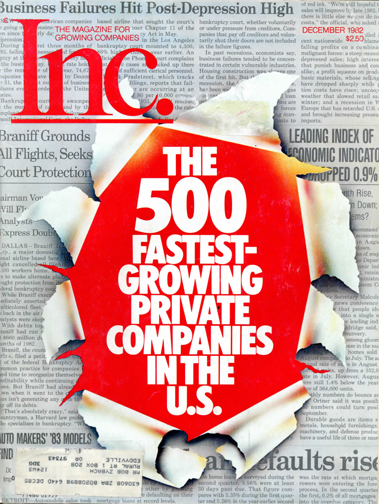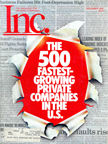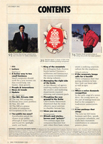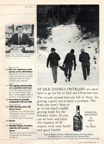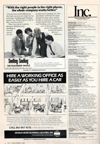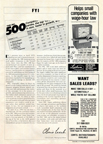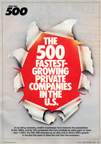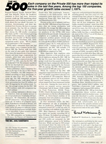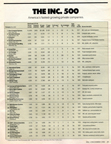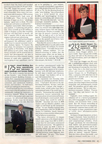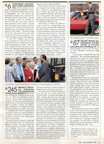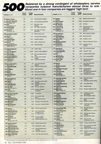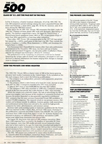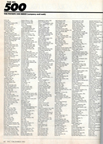Cover of December 1982 Inc. Magazine with mailing label to "Bob Zybach, Rural Rt. 1, Box 208, Eddyville, OR 97343."
REFERENCE: Leach, Chris, Anna Davidian, Bradform Ketchum, Jr., Curtis Hartman, Robert Mamis, Bruce Posner, and Robert Wood 1982. "Inc. 500: The 500 Fastest-Growing Private Comapnies in the U.S.," Inc. Magazine, Vol. 4, No. 12, December: 5-60. [PDF_8_MB]
Phoenix Reforestation, Inc. was a forest management service company that I formed and operated for nearly 20 years; beginning with its immediate predecessor companies in early 1970 until about 1990, when financial problems and the worsening forestry-based economy in the Pacific Northwest finally caused Phoenix to go out of business. In its heyday -- from the mid-1970s to the early 1980s -- Phoenix reguarly grossed $300,000 to $500,000 a year, supporting 12 to 40 full-time workers year-round, at wages that varied between $6 and $15/hr.; a livable wage at that time, and among the highest in the reforestation industry. Phoenix and I each belonged to a small number of trade organizations and professional associations in which we were active for many years; most notably Associated Reforestation Contractors, Inc., Associated Oregon Loggers, Inc. and Small Woodlands Association of Oregon. During that time I was Phoenix's principal representative; when the company was breifly revived during the first few years of this century, Rod Slattum -- an original partner from the early 1970s -- became the principal Phoenix representative.
In 1982 Phoenix was selected as the 332nd fastest-growing private business in the US by Inc. Magazine. The magazine had previously been selecting a Top 100 list since its founding in 1979, but had expanded to 500 companies in 1982, which is why a tiny "tree-planting company" in rural Eddyville, Oregon was able to make the list. Too, I think our gross annual income had grown from $100,000 to $500,000 or so during the judging period, so our growth had also been remarkably rapid for that time frame. Unfortunately, by the time the Inc. 500 were announced, Phoenix had headed into a rapid downward financial spiral, along with a large number of its competitors and associates in the forest industry -- including loggers, truckers, road builders, sawmill workers, and all of the rural service industries and manufacturers that served these businesses. A radio show broadcasting live from the Oregon State Fair that summer interviewed me by telephone regarding being one of Oregon's few [maybe only?] representatives in the Inc. 500 for the year. Maybe he also asked about the outlook for the forestry industry at that time. My answer was that if Inc. Magazine did their survey at the time the interview was taking place, rather than the previous year, we would defintiely qualify as one of the US's 500 fastest falling companies. Things had turned predictably bad and would continue to get worse in the following decades for the forest industry in the Pacific Northwest.
The background headlines on the1982 Inc. Magazine cover demonstrate that it was not only the forest industry that was going through hard times in the early 1980s -- it was a lot of other businesses, too; e.g., "Business Failures Hit Post-Depression High" and "Braniff Grounds All Flights, Seeks Court Protection." Reading the ads in the magazine and checking out the photos of the all-white, young, apparently successful business people dressed in suits and showing off fancy cars and new products gives an interesting perspective on the business climate for entrepreneurs at that time. Now, more than 30 years later, the Inc. 500 has morphed into an online magazine that features the "Inc. 5000."
The 1982 Top 100 were selected for the fourth year in a row, topped by Altus Computer in California (p. 42) as #1. Other Top 100 businesses profiled by the magazine include #6 Compu-Shop in Texas (p. 45); #24 Polaris Vac-Sweep Corp. of California (p. 44); and #87 Corvette America Inc. in Pennsylvania (p. 45). Personal computers, swimming pool cleaners and fast cars in a "post-depression high" economy.
The inaugral 1982 Top 500 list included all first-timers for numbers 101 to 500; in that regard, Phoenix was the very first #332 in Inc. 500 history. Others profiled in this category by the magazine included: #118 Cook Machine Co. in Oklahoma (p. 44); #175 Jewell Building Systems of North Carolina (p. 43); #212 Amigo Sales Inc. of Michigan (p. 44); #213 Queen Oxygen Co. of Ohio (p. 43); and #245 Munsen's Discovery Enterprises Lts. of Illinois (p. 45). It would be interesting to see how these people are doing now, at this time, 33 years later.
| Pg. 5. Leach 1984: 5 | ||||
